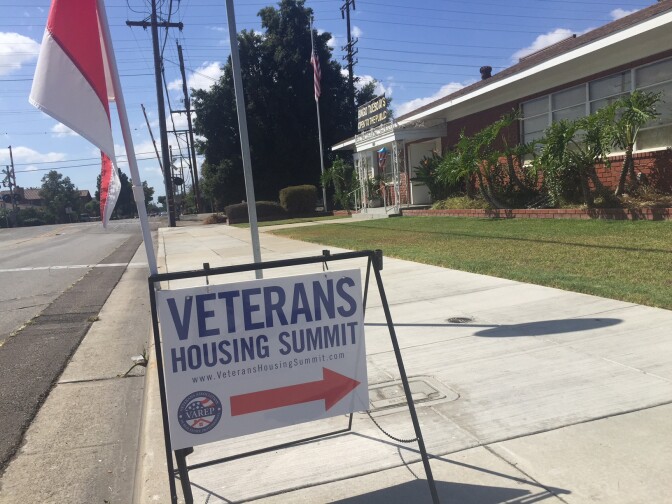This story is free to read because readers choose to support LAist. If you find value in independent local reporting, make a donation to power our newsroom today.
This archival content was originally written for and published on KPCC.org. Keep in mind that links and images may no longer work — and references may be outdated.
GOP tax bill could make it harder for California veterans to get home loans

A program offering home loans to California veterans could become an unexpected casualty of federal tax reform.
The tax bill currently making its way through the Republican-controlled House of Representatives would eliminate the type of bond funding that allows California's Department of Veterans Affairs, or CalVet, to issue veteran home loans, putting a nearly century-old program in jeopardy at a time when voters are being asked to extend it.
CalVet's home loan program began in 1921, first conceived as a leg up for returning World War I veterans.
"We’re that community bank. We care about the veteran," said CalVet deputy secretary Theresa Gunn. "We want to keep them in their home. We want to help them to achieve their dreams of home ownership."
The state makes the loans available by selling bonds, which are repaid with veterans’ mortgage payments, meaning the program is self-contained and has never dipped into the general fund. Investors don’t have to pay taxes on the interest generated by veteran mortgage bonds.
The federal tax code recognizes these as private activity bonds. The same model is used by state and local governments to fund municipal projects like affordable housing, museums, and schools.
"The vast majority of financing for infrastructure in communities and states around the country is coming from local bond issuances," said Tim Fisher with the Council of Development Finance Agencies. "It’s not coming from federal dollars."
The tax exemption for private activity bonds would be eliminated by the House tax reform bill, effectively killing this bond funding model, he said.
"The objective is to raise revenue here,’ he said. "But what that would do to communities around the country is undermine their ability to finance all sorts of developments that we take for granted."
Gunn says the veteran home loan program would have to change its funding model, theoretically moving to a taxable bond.
"It makes the cost for us to borrow money to lend out higher, which would be passed along to the veteran homeowners," she said.
That would likely translate to higher interest rates and lower borrowing caps for veteran homebuyers. Gunn says this would cripple the state’s ability to compete with private banks and mortgage lenders.
If the House bill passes with its current language, Gunn said, veterans who couldn’t find private loans will be stuck with a depleted program and curtailed purchasing power.
Vets using the program would have to settle for "smaller homes that may not meet their needs, homes that may not be in cities," she said, all the way to less expensive housing structure types such as mobile homes or manufactured homes."
The Senate tax bill would preserve private activity bonds. Fisher says his organization and other advocates are working to ensure the Senate’s language ultimately becomes law.
"There will likely be a conference committee, and what will emerge from there will hopefully protect private activity bonds," he said.
CalVet’s home lending program has gone through major changes in the past, often due to the fluctuation of financial markets. In the 1970s and early 80s, when interest rates were sky-high, CalVet was able to offer rates far below those available through the private market, and thousands of loans were issued each year.
During the recession, the popularity of the program plummeted. In 2013, just 49 people took out a CalVet loan.
As the housing market recovered, CalVet has been slowly rebuilding its lending program. In the 2015-16 fiscal year, the department issued 675 new loans totaling $222.7 million.
Voters are being asked to renew CalVet home loans next November for a 28th time. Legislators in Sacramento added $1 billion in veteran home loan bond authorization to a $3 billion affordable housing measure slated for the statewide ballot.







